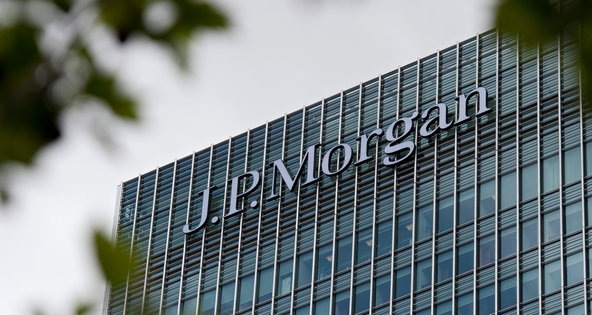 Carl Court/Agence France-Presse — Getty ImagesThe offices of JPMorgan Chase in London. The trade losses were associated with London workers.
Carl Court/Agence France-Presse — Getty ImagesThe offices of JPMorgan Chase in London. The trade losses were associated with London workers.
The fallout continues from a multibillion-dollar trading loss at JPMorgan Chase.
JPMorgan, the nation’s largest bank, is suing Javier Martin-Artajo, a former executive in its chief investment office, a once little-known unit at the center of the bungled trades. Mr. Martin-Artajo directly supervised Bruno Iksil, the so-called London Whale, according to a lawsuit made public on Wednesday.
Mr. Iksil gained that moniker after reports emerged in April that he had built up an outsize position in an obscure corner of the credit markets. That position proved devastating for the bank, resulting in a $6.2 billion loss.
Related Links
The lawsuit, filed in a London court, did not disclose the details of JPMorgan’s claims against Mr. Martin-Artajo, according to a person who read the complaint.
Both men have left the bank. A spokeswoman for JPMorgan declined to comment on the lawsuit. Mr. Martin-Artajo’s lawyer could not be reached immediately.
Since announcing the problem in May, JPMorgan has worked to reassure skittish investors. The bank has broadly reshuffled its management ranks and united some of its business operations.
Timeline: JPMorgan Trading Loss
As part of that effort, the bank conducted an internal investigation, combing through thousands of e-mails and phone records to determine what went wrong at the chief investment office.
The investigation, led by Michael J. Cavanagh, the bank’s former chief financial officer, found that some traders might have improperly valued their positions as losses mounted.
Some phone recordings suggest that Mr. Martin-Artajo encouraged Mr. Iksil to value troubled positions favorably, according to people with knowledge of the investigation.
Mr. Martin-Artajo, Mr. Iksil and two others who worked in the chief investment office are under investigation by criminal and civil authorities, these people said. The authorities are examining whether the group mismarked positions to cover up losses. After revising the valuations, JPMorgan had to restate its first-quarter earnings.
But authorities face a high legal bar. Traders are given significant leeway to price financial instruments like the complex credit derivatives at the center of the bet. None of the people have been accused of criminal wrongdoing.
JPMorgan, too, faces scrutiny. The Securities and Exchange Commission, the Office of the Comptroller of the Currency and the Federal Reserve are all looking into the botched trades.
The aftershocks have been felt throughout the bank. The multibillion-dollar loss tarnished the reputation of Jamie Dimon, the bank’s chief executive, considered one of Wall Street’s best risk navigators. In June, Mr. Dimon appeared before Congress to try to explain the misstep.
The debacle also claimed the job of one of Mr. Dimon’s most seasoned and trusted lieutenants, Ina R. Drew, who resigned as head of the chief investment office shortly after the losses were announced and offered to give back her pay. The bank has clawed back millions of dollars of compensation from Mr. Martin-Artajo, Mr. Iksil and others.
Mr. Dimon has moved to remake his management team. Douglas L. Braunstein, the bank’s chief financial officer since 2010, will resign by the end of the year, current and former executives said. Mr. Braunstein initially played down concerns about the chief investment office that emerged in April. Barry Zubrow, a former chief risk officer who now runs the bank’s regulatory affairs, said last month that he, too, would resign.
The huge loss stemmed from a complex wager on credit derivatives made by Mr. Iksil out of the London unit of the chief investment office, which was formed five years ago. The office was transformed from a relatively sleepy operation into a profit center as the complexity and risk of its positions swelled.
The group’s risk controls did not keep up with its increasingly large bets, according to several current and former executives familiar with the unit. Part of the problem, these executives said, was that the London branch operated without sufficient oversight. When some executives in New York called for greater risk controls, they said, they were ignored or shouted down.
During JPMorgan’s latest earnings call, Mr. Dimon emphasized that the bank had contained the loss from the troubled trade. It closed out the position and moved the remainder of the credit derivative trade to the investment bank.
Ben Protess and Mark Scott contributed reporting.
Article source: http://dealbook.nytimes.com/2012/10/31/jpmorgan-sues-boss-of-london-whale/?partner=rss&emc=rss

